*** Proof of Product ***
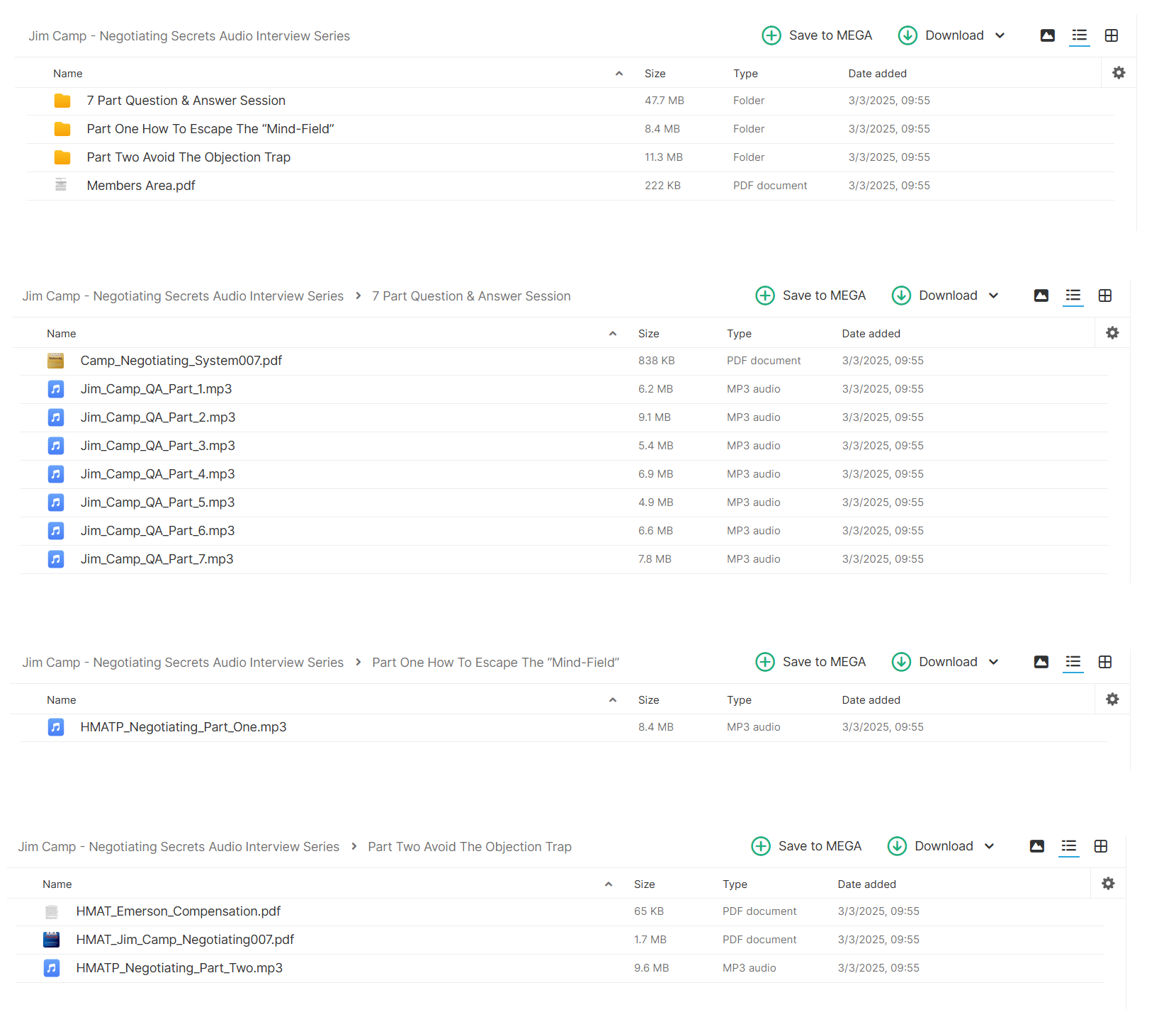
Exploring the Essential Features of “Jim Camp – Negotiating Secrets Audio Interview Series”
Jim Camp Negotiating Secrets Audio Interview Series
I’m Michael Senoff and I’ve teamed up with Jim Camp, arguably the worlds top negotiator to bring you a training the likes you have never heard before.Jim Camp was the leading global expert on negotiations. Over the last 25 years, he trained and coached over 100,000 people to negotiate better, more profitable agreements in more than 500 multinational organizations.
Nine years ago, I was fortunate enough and invited to interview Jim for a group of marketing consultants I was training with my HMA Marketing Consulting System.
Jim told me my consultants could ask him anything on the subject of negotiating and there was no time limit on the interview.
It’s unbelievable what I was able to get out of Jim in these interviews.
I interview him as I’ve never interviewed anyone before.
In this nine part training, you’ll hear Jim’s answers to over 174 select questions on the the secrets of negotiating.
Consider this your master class on the subject of negotiating and learn how to finally and strategically get what you want.
The late, great, Jim Camp is no longer with us today. But his words, stories and trainings live on. He was the best there’s ever been.
It’s all here in your Jim Camp Negotiating Secrets Interviews below.
HERE’S WHAT THE JIM CAMP MASTER NEGOTIATOR INTERVIEW SERIES WILL DO FOR YOU
If you’ve ever lowered your price, lost a prospect or compromised on anything in your personal or professional life, these negotiating interviews will change everything for you.
Once you understand the lesser-known negotiating strategies and use a system of negotiation, you’ll have found the one tool that can get you what you want.
This includes what you want in business, what you want in your home life and what you want in your personal relationships including both family and romantic.
People don’t get what they want, they get what they negotiate. And this one statement has never been truer than it is today.
Download, listen to or read the transcripts to all nine parts (420 minutes of expert training, 174 Questions Covered ) of the Jim Camp Master Negotiator Interview Series.
Then study and use his techniques and you’ll gain an understanding about the one of the most powerful life secrets known to man. How to negotiate winning agreements.
HERE’S WHAT YOU GET
1) Part One: How To Escape The “Mind-Field”
Confidence is everything. If you let fear and worry dominate your mind before a meeting by telling yourself things like, “They’ll probably think my fees are too high for my amount of experience,” you’ll end up compromising your whole negotiation – including your integrity.
Every decision is based on an emotional vision. So you have to find a way to get into your adversary’s vision and become an integral part of it. And in Part One, you’ll hear how to do that. You’ll also hear…
• Why coming across as a stumbling, bumbling “nice guy” may give you a leg up at the negotiating table
• The seemingly harmful (but deal-killing) statements most people make that could be costing them millions of dollars every time they say them
• How to apply negotiating techniques to cold calling that will put prospects at ease and help you get through to decision makers
• Simple ways to put an end to challenges and objections by essentially making every “no” look like a “yes”
• How to use the system to “get in the zone” and close every deal on auto-pilot
• The one best way to stop sounding needy and desperate during a negotiation – even if you ARE needy and desperate.
Part One is 42-minutes and includes an accompanying 48-page transcript containing both Part One and Part Two
2) Part Two: Avoiding The Objection Trap Is As Simple As Leaving All “Intellectual” Information At Home
Jim has never given a PowerPoint presentation in his whole 40-year career and doesn’t plan to either. Why? Because once you start presenting intellectual information in a negotiation, you’re opening the door for objections. Instead, you want to create a vision.
But because this is your adversary’s vision and not yours, you should only be concerned about questioning and listening – and never “presenting.”
And in Part Two, you’ll hear how to do that, along with…
• The one and only time you should walk away from a negotiation – and the outcome likely to happen if you do
• Why you’ll never hear Jim use words like “power,” “leverage,” and “advantage” – and what really drives a successful negotiation
• How to create a “vision of pain” in your adversary and how to use that to negotiate a beneficial conclusion for yourself
• The most certain way to set an agenda that allows your adversary to see the value of what you’re offering
• The 4 main variables that affect the outcome of every negotiation
Most people walk into a negotiation and just start presenting. They think they’ll be able to convince the other person that they need whatever they’re selling. But it usually doesn’t work that way.
So be prepared to throw out everything you’ve ever learned about negotiations and keep an open mind because this audio is likely to change the way you make agreements in all aspects of your life.
Part Two is 39-minutes and includes an accompanying 48-page transcript containing both Part One and Part Two
3) Boiling It Down To The Basics: How To Get Started The Right Way
Little kids are great negotiators. Problem is, as we get older the fear of failure sets in, and it becomes harder and harder to get out of that mindset. But it’s not impossible. Every brain on the planet makes decisions in exactly the same way.
So once you have a system in place, you won’t need to worry about negotiating anymore. You can just relax and know that you won’t be cutting your price, sweating out a compromise, saying the wrong things or even worrying about the outcome – because you’ll perform every negotiation the right way… and on autopilot.
So in Part One, Jim uses the first 25 questions from students to break down his system to its most basic level in order to give you the solid foundation you need to start mastering every agreement.
You’ll Also Hear…
• How to recognize when you’re falling into the “mindset of fear” and how to get out fast
• 5 quick-start steps that will take you through even the toughest of negotiations
• The attitude-trap you won’t want to fall into because it instantly builds barriers and puts people off before you even open your mouth
• What you need to know about “hiding the ball” in a negotiation and when to use that strategic device
• The one correct attitude you should have for a successful negotiation (Believe it or not, it has nothing to do with being positive or negative)
• Exactly what Jim calls the “greatest waste of resources” and how to stop yourself from falling into that worst case scenarioYou can’t win or lose a negotiation. And you can’t convince someone to do something. This system isn’t about manipulating a negotiation; it’s about mastering it. And Part One will help you get rid of any preconceived notions you have about the process, so you can start right where you need to be – at square one.
– 36-minute audio, 13-page transcript
4) Managing Raw Emotions and Fear
You can’t be weak or timid in a negotiation, but you can’t be aggressive either. Aggressiveness gets gobbled up too. So what do you do when you’re bubbling over with natural anxiety, fear, desperation, or an all-around lack of self-confidence? That’s where having a system in place makes all the difference.
And in Part Two, Jim answers questions 26-79 from students about managing fear while staying focused and calm during a negotiation.
The good news is, Jim says people who aren’t naturally assertive make great negotiators once they know the system. In fact, it may actually be a good thing not to be overly confident. And in this audio, you’ll hear how to make your emotions work for you. You’ll also hear…
• The most difficult piece to the negotiation puzzle that must be determined before you sit down to any negotiating table
• How to create a “vision of failure” in gatekeepers that will have them believing it’s in their best interest to let you through to the decision maker right away
• The one and only way to rebound once you’ve shown you are timid, weak, or needy
• How to use the “three-plus” rule to uncover mistruths and misdirection, peel back the onion, and get to the psychology of any sticky situation
• Exactly what to do when an adversary is being overly aggressive or deceptive
• The no-pain way every negotiation should endUnfortunately, you can’t just “wing it” when it comes to confidence, but that doesn’t mean there’s no hope. And in Part Two, you’ll hear how to end your fear of failure and take control over your emotions – no matter how intimidated you are.
– 53-minute audio, 22-page transcript
5) The Meat And Potatoes Of Negotiating Success: Creating The Vision You Need
Jim is always on. During a negotiation, he’s not worrying about his presentation. He’s busy running research about his adversary – by listening, probing, taking mental notes, and learning. Too many people forget to do that and instead become so busy trying to “show what they’ve got” in 20 minutes or less that they end up frustrated. And wondering why the negotiation failed again.
If you can get into the world of your adversary, you can integrate yourself into their vision. And that’s a huge part of a successful negotiation.
But in order to do that, you have to stop thinking win-win. According to Jim, that mindset only makes people feel like they need to win at any cost (and that cost usually comes at your own expense). So in this Q-and-A interview, you’ll hear Jim answer questions 80-96 about the mindset that works to create the vision you need. You’ll also hear…
• What Jim describes as “the giant negotiating secret weapon” – Master this and you’ll master negotiation
• How to make multiple “one-bite-at-a-time” mission statements to help you stay focused during every aspect of your negotiations
• Key strategies for taking care of the problems that could be holding you back– like pricing, past performance, whatever – and end them for good
• How to prepare the all-important checklist that will guide you through every turn, like a personal negotiation-GPS
• The critical nuances to “three-plus” that could make or break how effective it is
• How Jim does his research on a client – and it doesn’t involve your run-of-the-mill, easy-to-acquire website searches
• A word-for-word script to use if a seemingly impossible impasse happens during a negotiationA great negotiation starts when you stop living in your world and start becoming a part of your adversary’s. And in Part Three, you’ll learn how to do that.
– 32-minute audio, 13-page transcript
6) How To Stop Compromising Once And For All
Even if you’re thinking, “I will NOT compromise this time,” you will – if the only tool you have in your negotiating toolbox is the mindset of “give and take.” You have to train your brain not to make assumptions or compromises, but it’s not easy because we’re surrounded by a flawed win-win mindset.
Think about it. What happens to businesses when the economy tanks? Margins get slashed because owners assume they need to compromise their agreements in the field. Then because profit margins are smaller, they ask employees to take pay cuts. And the employees likely will – because they also have a mindset of compromise. It’s a vicious cycle.
But it doesn’t have to be. And in Part Four, you’ll hear Jim answer questions 96–126 from students about how to create the only mindset that works.
You’ll Also Hear…
• How to get in the habit of using what Jim calls a Blank Slate mindset instead of the usual “Ivory Tower” win-win one
• Exploding the “tactic” myth – why tactics never work in a negotiation and what you should be doing instead
• Exactly what to do with your body posture and voice that will instantly ease tension – while giving you the appearance of having “relaxed confidence”
• A real-life look at three-plus in action – with examples of how to use it to bring out your adversary’s vision
• When and how to confidently throw out the “first offer” in a negotiation without worrying about being shot down in flames
• Exactly what causes 99% of all challenges faced at the negotiating table and how to be prepared for whatever comes upHaving a win-win mindset is like being stuck in a sad little fishbowl full of compromises and “tactics.” Because you can’t get anywhere with it, this kind of mindset only costs you money, opportunities, and growth. And in this audio, you’ll hear how to get out for good.
– 40-minute audio, 16-page transcript
7) The Only 3 Things That Matter In A Negotiation
If you believe your adversary has “power” in a negotiation, you’re setting yourself up for failure before you’ve even begun. That kind of mindset will only generate a self-induced, fearful emotional state. And you’ll be worrying for nothing too.
According to Jim, there is no such thing as power in a negotiation. Or leverage. And believe it or not, he says the price is never a factor either. In fact, it doesn’t make a difference what you’re negotiating, there are only three things that matter – vision, opportunity, and decision.
And in Part Five of this Q-and-A section, you’ll hear Jim answer questions 127-147 from students about how to create those kinds of key elements for every niche, including…
• How having a system will beat back any “tactic” your adversary may try to throw at you
• Exactly what to say to a competitor if he flat out asks, “So… is this going to be a win-win agreement?”
• Negotiating advice for job seekers along with a quick story about how Jim got one of his negotiating students twice the income he was currently receiving
• Why you probably won’t want to tell your adversary that you can increase his profits – and examples of what to say instead that will actually help them visualize the money In order to have a successful negotiation, you have to stop worrying – about power, fallback positions, and especially compromise because none of that matters. But the good news is – with Jim’s system, you’ll be able to relax and know you’re ready for everything that comes up
– 28-minute audio, 10-page transcript
8) A Foolproof Way To Avoid Failure
Jim says that whenever he’s called in after a failure, he can usually attribute it to a lack of mission and purpose. It doesn’t matter how great you think a negotiation will go, or what industry you’re in – without mission and purpose, things will go wrong. But it’s not enough just to have those things in place. Both your mission and purpose have to be well thought out, clear, and step-by-step. You also have to make sure they benefit your adversary.
So in this audio, you’ll hear Jim answer more niche-specific questions from students about how to create success in joint ventures, contingency deals, research, audio interviews, and more.
You’ll Also Hear…
• The one simple question to ask that could get you past a gatekeeper right away – Jim asked it, and got one of his clients in to see Lee Iacocca
• How to have the highest price and still be in the running (even for one of those “the cheapest bid will get the contract” web auctions)
• The top 4 ways to create skin in the game using what Jim describes as “the key to the money”
• A word-for-word script to use when a potential client asks, “Okay, so how much is this going to cost me?” that will take the pressure off the price
• How to use Jim’s system in your personal life – and negotiate insurmountable debt, rent, and other cost-of-living staples
• How to make the only kind of contingency deal that’s worth itHaving a strong mission and purpose is critical for negotiating success. But you can’t just create a vision for yourself; you have to create one for your adversary as well. Show them that you understand their problems and challenges, and they’ll be compelled to dig into the opportunity you’re giving them. And in this audio, you’ll hear how to make that happen.
– 38-minute audio, 14-page transcript
9) Jim Camp’s Most Important Case Studies
– 59-minute audio, 40-page transcript
Hear case study after case study from Jim Camp from his incredible career of high-level negotiation.
You’ll hear . . .
* The story about the hostage negotiator.
* The story about how Jim negotiated for a gift for his Mom.
* Hear the story of how he negotiated help for his friend’s wife who was having a baby.
* Hear the story of how he negotiated for the Nabisco Trade Mark.
HERE’S WHAT THE JIM CAMP MASTER NEGOTIATOR INTERVIEW SERIES WILL DO FOR YOU
If you’ve ever lowered your price, lost a prospect or compromised on anything in your personal or professional life, these negotiating interviews will change everything for you.
Once you understand the lesser-known negotiating strategies and use a system of negotiation, you’ll have found the one tool that can get you what you want.
This includes what you want in business, what you want in your home life and what you want in your personal relationships including both family and romantic.
People don’t get what they want, they get what they negotiate. And this one statement has never been truer than it is today.
Download, listen to or read the transcripts to all nine parts (420 minutes of expert training, 174 Questions Covered ) of the Jim Camp Master Negotiator Interview Series.
Then study and use his techniques and you’ll gain an understanding about the one of the most powerful life secrets known to man. How to negotiate winning agreements.
You’ll Hear Jim Camp’s Answers To These 174 Questions Below
1. Jim, what is your approach to negotiating?2. Is negotiating a skill that you are taught in a formal classroom setting or is it a skill set that comes with experience?
3. Tell me what you teach when it comes to negotiating different from what we’ve all seen in the win-win model.
4. What is the biggest misconception with your methodology of negotiation?
5. What’s the ultimate goal with your negotiating system?
6. What is the single most important thing one needs to know about negotiating? Is it to start out with strong demands so that you have some room to fall back?
7. So how do you factor in cultural differences when it comes to negotiations?
8. Describe for the listeners what is collective bargaining.
9. So bargaining is win-win?
10. What do you mean by hiding the ball?
11. What skill, Jim, do you think is most critical to a successful negotiation?
12. What are the stages you go through in a tough negotiation?
13. Why should the listeners want to learn more about the subject of negotiating? What is in it for them?
14. Do you have a mind map about all of the steps or which specific steps to follow when conducting a negotiation?
15. What do you think is the most important attitude to carry into any negotiation?
16. You mentioned FBI and it just sounds like a great story. Is it something you can share?
17. So are they actually using the revamped negotiating?
18. What is the one thing you believe that all great, truly great, negotiators have?
19. How do you decide whether to negotiate something or not? What guidelines do negotiators use to determine whether or not to negotiate or not negotiate something?
20. How do you make sure that you are dealing with the real decision maker in a negotiation?
21. There must be a lot of times in the world where people are negotiating to the wrong people.
22. I believe that negotiating is learning the beliefs and wants and desires of the other person. Do you believe that psychology plays a big role in negotiating?
23. Is there basic psychology to winning or is there a basic rule to win when negotiating like never giving in first or always give in first, etcetera?
24. How important is persuasion architecture in negotiation?
25. Jim, I’m new at negotiating. Do you currently, or did you have when you first started, a cheat sheet to keep on your mind while going into negotiations? For example, to help you remember the top five things to focus on when going into negotiations or do you have an acronym that you used to remind yourself what to keep in mind when first trying to master negotiation? Also when you first started negotiating did you have any fears going into negotiation and if so how did you overcome them and what did you focus on?
26. What is the best advice for a new negotiator to learn?
27. How do you know if you’ve negotiated the best deal, Jim?
28. How hot is the topic of negotiation skills within small companies? Is it regularly trained or is it overlooked as a skill to develop within the corporate culture?
29. Jim, do you go into negotiations knowing the exact outcome you want?
30. How do you determine when to walk away? Or, in other words how do I know when it’s time to break off the negotiation?
31. Often times the decision makers are surrounded by gatekeepers of different sorts: assistants, managers, etc. What is your best suggestion for negotiating with these gatekeepers to get through to the owner, principal, or decision maker?
32. How do you quickly determine other party’s hot buttons; that is what their number one need is out of the proposed agreement?
33. Can an interrogative negotiation be effective when parties have unequal power where one is recognized as having a greater position or strength?
34. Jim, I sometimes deal that with international customers who seem to have no problem with win-lose negotiations, how should I deal with them?
35. What makes the difference between a good negotiator and a great negotiator?
36. Other negotiation coaches teach tactic and closing, how do you go about dealing with these types to negotiators using the Camp method?
37. Isn’t it true that both sides should feel some pain at the end of a successful negotiation? Please elaborate.
38. How do you know when you have gotten everything possible out of a deal?
39. Why don’t Power-Point presentations work? Why do so many gurus use them?
40. So often I hear women trying to act like men in business. How can women be more effective in negotiating?
41. How to I encourage someone to negotiate who refuses to consider any option other than what is best for them?
42. How much do you need to negotiate before you sign a contract? Are there details that can be ironed out after signing? Or is it good to have all the details nailed down before signing anything?
43. I would like to hear you, Jim, debunk the common myths of negotiating such as make an offer and shut up, next person to speak loses, feel free to add any of your own.
44. Hi Jim, is it a process that you follow when you are going nose to nose with the big boys?
45. How does negotiating via email differ from face to face or telephone negotiating?
46. It is more effective email or phone?
47. What can you do when the other side won’t even come to the table and doesn’t appear to be able to afford the laid down arbitration procedure?
48. What’s the mindset you start with going into any negotiation when you know the other guy is very skeptical or defensive about what you’re proposing or offering?
49. Jim, how do you deal with people who get difficult or aggressive in a negotiation?
50. How do posture myself with confidence but not arrogance, so everybody wins?
51. How does one build trust during a negotiation?
52. Can you give some negotiating tips for people that are not naturally assertive?
53. What’s the best approach to negotiating working with a clo
59. How do I manage my emotions, for example, unhappiness and anger, during the negotiation process?
60. How can an introverted person overcome the fear of negotiation?
61. I don’t do much formal negotiating in my job, but when I do, I very often feel intimidated by the other party. So my question is, Jim, how do you control feelings of weakness and a lack of self-confidence in negotiations?
62. What should you do if you really do need to make a deal happen? How can you still negotiate from strength?
63. How much does physical stance portray in negotiations?
64. How do you deal with the adversary who brings a psychic to the negotiating table?
65. How do you persuade someone to do something if they are adamant about not doing it?
66. I’m a struggling small business owner and a marketing consultant. Is there a way to appear more confident and relaxed when sitting down to negotiate price and terms for my consulting services? I know in earlier recordings you have even recommended working part time, etc., in order to be in a better position. I’m doing quite a few things for income, but I’m still coming up short. I have a rather large opportunity coming up with a cash-flush client, and want to negotiate a long-term agreement with a significant amount up front. My true situation is that I’d take just about anything he offers, because I need the money. It’s an okay position to be in, but bad for negotiating my real needs. I’m also afraid of negative subliminal needy vibes, not just in this case, but my day-to-day prospecting and selling. Could a bad financial situation be hindering many of us in this difficult economy?
67. Are there things to look for that could indicate the person you are negotiating with is dishonest or the deal is dishonest or a lie?
68. You’re getting ready for the biggest make-or-break deal you’ve ever had and you are feeling the stress. What self-talk do you use to calm yourself down?
69. When one has a problem with self-confidence, and they come across as fearful, timid or weak to the other party in the communication of a business deal, how can that person rebound within the negotiation to gain credibility and the upper hand in the mind of the other party.
se friend so as not to ruin the friendship, but to get business done?
54. What’s the best strategy for people who are slow on their feet when negotiating has to be done in person?
55. How do personality types affect negotiating? Can you tailor strategies to specific traits or personality types?
56. What subtle body movements or voice inflections indicate to you that a client is ready to negotiate in your favor?
57. I tend to be a friendly person, but in negotiating people see that as a weakness and attempt to take advantage of that. How can I establish early on that friendliness does not mean I’m giving you all that you ask?
58. How can a person who is non-confrontational by nature, become comfortable jockeying to get what you want in a negotiation?
59. How do I manage my emotions, for example, unhappiness and anger, during the negotiation process?
60. How can an introverted person overcome the fear of negotiation?
61. I don’t do much formal negotiating in my job, but when I do, I very often feel intimidated by the other party. So my question is, Jim, how do you control feelings of weakness and a lack of self-confidence in negotiations?
62. What should you do if you really do need to make a deal happen? How can you still negotiate from strength?
63. How much does physical stance portray in negotiations?
64. How do you deal with the adversary who brings a psychic to the negotiating table?
65. How do you persuade someone to do something if they are adamant about not doing it?
66. I’m a struggling small business owner and a marketing consultant. Is there a way to appear more confident and relaxed when sitting down to negotiate price and terms for my consulting services? I know in earlier recordings you have even recommended working part time, etc., in order to be in a better position. I’m doing quite a few things for income, but I’m still coming up short. I have a rather large opportunity coming up with a cash-flush client, and want to negotiate a long-term agreement with a significant amount up front. My true situation is that I’d take just about anything he offers, because I need the money. It’s an okay position to be in, but bad for negotiating my real needs. I’m also afraid of negative subliminal needy vibes, not just in this case, but my day-to-day prospecting and selling. Could a bad financial situation be hindering many of us in this difficult economy?
67. Are there things to look for that could indicate the person you are negotiating with is dishonest or the deal is dishonest or a lie?
68. You’re getting ready for the biggest make-or-break deal you’ve ever had and you are feeling the stress. What self-talk do you use to calm yourself down?
69. When one has a problem with self-confidence, and they come across as fearful, timid or weak to the other party in the communication of a business deal, how can that person rebound within the negotiation to gain credibility and the upper hand in the mind of the other party.
70. Some years back I heard it said, “He who cares least, wins.” Since then I have followed this selling negotiating technique and employed it moderately successfully. It allows for me to be myself, and more relaxed when sending a positive and reassuring signal to the other guy. Truthfully I did not always come away from the table with what I wanted to occur, but often what would happen is they would call me back and tell me things like, “We like your style and feel more comfortable with you.” Or they would tell others about me. In short, I tried to negotiate in such a way that all parties were relaxed. The bonus was multiple long-term deals came my way. Any suggestions on how I can take my personal style and improve on it?
71. How do I know when I’m asking for too much in a negotiation situation? I have been told that it’s effective to appear intimidating in negotiations, however, I have a friend who is so nice and jovial when he meets people, but yet he seems to always get his way when negotiating. Please what is the best kind of persona to portray when getting into any negotiation situation?
72. With negotiating with a Fortune 500 or anybody thinking about it, how do you use your body language to determine if they are lying or misleading on an answer? Can you give examples of this if possible?
73. Why do you think reading body language and all that doesn’t work?
74. Jim, how did you get your first start in the world of negotiating? Did you intern; did you have mentor, etc.? How did you get started?
75. In the first interview we did, Jim, you mentioned you negotiated the care of premature twins. Could you elaborate a little bit on that story?
76. Jim what is the toughest negotiation situation you’ve ever encountered, other than that story, and why?
77. Describe your biggest negotiating mistake? What did it cost you and what should you have done differently?
78. Jim, what book, or seminars, or mentor, has had the deepest influence on shaping your negotiating skills?
79. When it comes to your negotiating practice or business, what do you see five or ten years down the road for your organization?
80. Jim, what are the pre-game steps for a negotiation meeting that will ensure you present value in a win-win situation?
81. How do you determine the real criteria of your adversary if maybe doing internet research isn’t enough so that you know whether a successful negotiation is even possible?
82. Can you give me a little peek into the window of what the three-plus strategy is?
83. When approaching big companies for the first time what prospecting strategies can one use to maximize your positioning from the beginning?
84. How do you decide what your limits are or what your limits would be in the negotiating process and what parameters do you set up to adjust your approach if the process is not moving in the direction you need it to move in?
85. If you beat someone up on price and then they relent and give you their product or service or expertise at a lower price they are losing in a way and that animosity is set and they may not deliver the value you would have gotten if you paid the regular price they were asking.
86. Before you negotiate how to you get people to hear your proposal? How do you ask for the opportunity of 10 or 20 minutes of their time to present something of value and then negotiate?
87. I was reading the press release you sent me this morning but it said it was a credentialized study and that it was being taught at Harvard and some of the other universities?
88. Jim, when you are going into negotiations I don’t suppose you do this without considerable investigation beforehand. How much time and effort do you spend in research prior to meeting with all the parties? Two, do you use a research time? And three, if so how do you hire them?
89. If you are doing research on a person with whom you will be negotiating a large contract with and you do this research by contacting individuals who know you are a negotiator well, what questions do you ask and why? Do you have a couple questions you would ask?
90. Jim, I have heard it said that your goal should be to initiate win-win negotiating. But what do you do if the other guy is only interested in win-lose negotiation?
91. Jim, what is your best technique to turn things around when you are in the middle of a negotiation and there seems to be an insurmountable impasse. How do you keep going even if it appears that your interests seem to be at opposite ends?
92. Jim, I know that business is competitive but do you think there is room for a true win-win negotiation where both sides are open and honest so that they can both get what they want so one doesn’t feel like they are getting screwed. After all, when you make an enemy you can’t do business with them ever again so you are really the loser even though you thought that you were smart.
93. How and when do you know it’s time to walk away from the negotiations without an agreement? How do you know when to quit?
94. What is the best phrase to say when walking away from the deal to get the last chance best offer from your negotiating partner?
95. What do you do if the person you are negotiating with himself is a master negotiator, what do you do?
96. Jim, how do you reopen a negotiation when you have slammed the table and walked away saying it’s over?
97. In negotiating with a business for its best terms, you feel you’ve gone too far, maybe a little greedy on your side, how do you pull things back from the brink?
98. Are there any specific strategies you use in negotiating when the knowledge you thought you had, had sufficient command to be successful comes up a bit short. He said it’s about impossible to be on top of every detail that comes up during such negotiations. So what happens when you come up short in your research?
99. I’m trying to negotiate a deal but can’t seem to get at the other party’s true agenda. How do I go about finding out what they really and truly want? I’ve tried asking in several different ways but always come out utterly confused.
100. Jim, when you get the feeling someone is still talking with you because they are just trying to milk more information out from you, without buying, how do you tactfully and gracefully stop the conversation by keeping the door open to be welcome again in the future?
101. Jim, how should I approach a one-sided negotiation scenario, wherein I desperately need something from the other side, but I have nothing significant to offer him or her in return?
102. Jim, now and then I’ve had the experience of making an offer to someone and having them immediately agree to it without any further negotiation. When this happens, I generally feel that I’ve inadvertently offered too good of a deal, and that I could have done better. Is there anything I can do at that point to find out whether it’s still possible to negotiate for a deal that’s more in my favor?
103. Jim, I usually give in on some non-material matters to get what I want in the two or three points that really matter. I often find this a useful tactic, but sometimes I get criticism for giving too much, even if it’s minor points, because they believe in absolutely maximizing their position every time. If course this depends on what you’re negotiating about. What is your take on this?
104. How and when do you decide that it’s a good time to stall a negotiation, and for how long can you safely stall it?
105. Your experience must have taught you some awesome things about selling when someone you’re negotiating with is all hat and no cattle. For those of us nice guys who seem to fall for every story imaginable, could you please hare with us your biggest clues that someone is just posturing, perhaps even a tip for testing them?
106. How is the best way to handle a standstill situation, where both sides are unwilling to shift or move from hardpoint?
107. Is it really true you should never make the first offer?
108. One of the techniques that I have been told works well is always agree with the other party and then ask them a question about the topic to bring them to your side in a progressive way. Have you used, or had any success with this?
110. Jim, I feel an important negotiating strategy is to show respect to the other side and not make them feel they are in danger of losing face. What are a list of substitution words you use to soften the dialogue from confrontational to rapport elegance?
111. So there are some physical elements that you’re teaching within your system that can have a subtle influence in the negotiation which are non-verbal?
112. In every negotiation, there comes a time when it is clear that what you want and what they want are not the same. How do you get your position out without risking the deal, while at the same time not giving up anything you don’t have to give up?
113. Can you demonstrate, Jim, an example of an interaction where you bring out your adversary’s vision of their pain and use it to Three Plus it with them.
114. Jim, are there ways to phrase your questions so that the words slip under the radar, thereby advancing your cause without raising their resistance?
115. During negotiations, I often find it beneficial to acknowledge and/or identify a negative such as, “There’s a potential with negative publicity with moving forward with this deal.” Sometimes I feel this works great and other times I’m just not sure. Any ideas or comments on a better tactic?
116. What is the most important mindset to have when you’re negotiating something critical with someone who you are sure is not going to want to give up anything?
117. When negotiating with a committee or group, how do you bring them back around when one member starts asking about what I consider trivial things to avoid making a commitment. Here’s an example. I often get fundraiser type programs. After giving them my best offer, and concessions, one member will start asking things like, “What if we only sell X number of units?” When I have already stated there are no minimums, or about start dates, etc. When I’m looking at this point for a simple interest or not, this often leads to a long session of others asking more trivial questions and having it tabled.
118. Jim, your negotiating concepts are gold. This question deals with inertia. What are some of your better ways to get the other side to be open to new or different ideas who are dissatisfied with their current position?
119. Jim, to me, a sales conversation is all about getting to their pain through my prospects eyes and showing them how my service would remove that pain, so that they can get to the outcome they really want, while negotiations seem to encourage compromise, which would mean that even before the sales conversation begins you’ll already be making certain assumptions about what the prospects want, which is usually a discount, what is your take on this, and what do you think would produce better results?
120. After you’ve negotiated a deal, how can you avoid the other person feeling that they could have gotten a better deal? Sometimes people feel we agree too quickly and they should have offered less?
121. What would you do in the situation when the other party won’t alter their price, and they’re not too keen on taking any add on value items? For example, buying a car, offering an item of value, example tickets to hot concert or something similar to entice or bump the deal over.
122. How do you offer a false close, to see if the other side will go for something without really committing to it? Like what words or phrases are useful for that?
123. In a negotiation, how do you determine what the other party really wants from the transaction? In many situations, a person may not feel comfortable revealing his or her true intentions or needs, so how can you get past that barrier if it comes up?
124. Most of us understand that in negotiating, the other party wants a better deal and as such we put in a buffer increase in price, whatever that is meant to be given away to the level that we ourselves want. What is another much better way of compromising and deal making?
125. When asking open-ended questions to gain information, what is the best way to stop the process from getting bogged down in social conversation? Could this simply be my problem in not focusing and planning well enough?
126. Jim, at times, I can undervalue the true worth of my services. What can I do to create a strong bargaining position? Two, I have always sought to create win/win situations in my life by trying to see things from the other party’s perspective. As a result I find myself, at times, over giving to maintain the relationship in a personal situation I am currently facing. I once read that in a negotiation I really shouldn’t be concerned about what the other party wants or needs, I should only focus on what I want or need. I have a difficult time doing this but at some level it makes sense. What are your thoughts?
127. Jim, what’s your suggestion for dealing with labor unions that hold a large degree of power in a negotiation?
128. Jim, I’m a chiropractic physician with twelve years experience. I give recommendations to patients based on what they need, and not what they can afford. For example: Pain relief for a few visits, or corrections over several months. What is the best way to give options that don’t overwhelm the patient but still allow them choices to give them help? In a written sheet with recommended services listed line-by-line item, or just a case feed given verbally across the desk?
129. I have a question about recruiting new salespeople for insurance; also it could apply to network marketing. You talk about, in your book, about not being needy and being in the other person’s world. How would you frame a recruiting process to not be needy in your interviews?
130. Jim, I am a commodity manager. I’m on the body side for a Fortune 100 company but often have very little leverage with suppliers due to our division’s low volumes, uncommon suppliers from the rest of the company and high volatility in the electronics market. My question is what is the best way to negotiate when you have very little leverage and the other side knows it? I’ve queried numerous negotiating experts and rarely have gotten a satisfactory or helpful answer. I hope you can help.
131. Jim, I come from a nursing background and always struggle to communicate effectively with patients when they don’t want to take their medications among other things. The thought of someone being hurt or dying because of my inability scares me. How do I remove the fear? How can I negotiate a quality result?
132. As a person who is working in the music industry, I often feel that I am not getting a fair shake when negotiating music deals. I feel like people make you feel bad or lucky to have a chance. I cave under the pressure because I know getting paid is not guaranteed. How do I continue pursuing the finer points that make a difference to me financially while putting their concerns to bed, ultimately coming out on top?
133. Lately I’ve been helping small business owners sell their businesses to third parties. How would you deal with small business owners that already think they are expert negotiators? It seems that entrepreneur types are so used to going it alone that many have trouble taking advice when negotiating, even to the extent of screwing up a deal.
134. I negotiate with personal injury lawyers for a living. Most of the time it is an adversarial relationship and many times I am well aware that my position is not as strong as the attorney I am negotiating with. What is the best way to negotiate when you know you have a weaker position than your adversary?
174. How do I negotiate with my son without sounding like a dictator?
136. Jim, I’m bidding on a big contract for the first time and I’ve found myself facing a seasoned negotiator complete with their legal team on their turf. It was supposed to be a technical clarification and I was not aware that it would lead to nitpicking about the contract specifications. How do I go about skirting the issue they raised, when I am not fully 100% with the legal aspects of the contract? I don’t have my legal aid with me.
138. I am interested in knowing how you would handle a situation where more than one company is competing for a contract and you want to outbid the competition but not give away the farm. How would you attempt to find out what would close the deal and lock out the competitors?
139. Jim, after reading and listening to your awesome material, when I start talking or negotiating with some I don’t really trust, what should I say when he starts with “Will this be a win/win deal?” Especially when I know that he’s not really thinking that?
140. I bought Start with No in 2003. I listen to your send off interview over, and over, and over. Both great. Question, I’ve used your methods successfully. Some clients want a contract, others don’t. Most of the time this works out. There is a thin line between trust and agreements. When should I insist on a contract? At times I’ve trusted too much and lost out on the deal.
141. I’m curious if your negotiation training is only for one-on-one sales situations, or can it be used in selling one to many. Like, for instance in a seminar or webinar?
142. Jim, I’ve enjoyed learning about your negotiating style. However it seems to take place at a high corporate level. Can your negotiating techniques work for just selling consulting services. How could a consultant employ your methods to gain a client?
143. What advice would you give people looking for jobs regarding negotiation in this soft market? The temptation for some of us to think, “Grab whatever they offer or they’ll choose someone else.”
144. When dealing with supermarket chains in our particular area, we find that they have a long-term supply agreement with our competitor who they have been dealing with for a number of years, and are unwilling to purchase from alternative suppliers. Their current supplier has a good relationship, and produces a product that is of very low cost to them. However as the supermarket profit is based on percent, and the product is basic with a low sale price, I believe they are missing out on potential profits. I’ve run this argument but have not had a positive response so far. Do you have any suggestions on how to develop a better approach on this point or where else I can look for motivation to have them switch suppliers other than price?
145. When negotiating a consulting or project fee, how do you resolve a consulting client’s initial question of, how much is it going to cost me? When even they do not have all of the required information needed up front, and the client needs information for their budgeting purposes and to report up to their boss?
146. I usually have two points in which I am prepared to close the deal. For example, what I would like, and what is the absolute minimum I will accept. The lowest point I can still make a small profit. How do I keep closest to my first point, what I would like?
148. Jim, if I’m cold-calling a business, how do I negotiate with the gates-keeper to put me through to the owner?
149. For someone just starting out with limited resources, if you were looking to focus your attention on setting up a potential joint venture or cross-promotion relationship with a local business, what would be your approach in negotiations?
150. Jim, if someone just started a new business and wants to enter into a joint venture with an established company or a businessperson, what are some of the techniques in negotiating so I do not lose out in the joint venture?
151. Jim, how do you best influence a tight buyer when you have the best product with the highest price?
153. Jim, how do you ask for more in a bad economy when your client’s business is down and all you really want to do is work less?
155. As a business consultant, should I have a list of set fees, for example, by the hour or by the job, etc., or should I just set a high figure and hope to get it, and then negotiate down if necessary
156. So what would you say when a potential client says “Well how much, Jim? What’s this going to cost me?”
157. How do you negotiate a deal without any money upfront?
159. When you feel that your relationship with your business partner is at its worst, and there is no point in return, what will be the final step that you will take to continue the relationship so that it benefits both?
160. How can I get a busy person, like a successful coach, a life, fitness, personal or money coach, to allow me to interview them in the knowledge that it’s really for my benefit? I want to use the interview as content for my website and to build a list. When they absolutely don’t need to. There doesn’t seem to be anything in it for them because I can’t offer massive publicity. After all, I don’t have a list for them, or their product. Can you give me some killer tips to almost have them begging me to interview them?
161. I prepared a marketing campaign or website for my client at cost with a promise for commissions. How do I make sure he will not find another developer or consultant after I reveal my program or plan?
162. If I don’t have a track record and I’m trying to put together a multi-million dollar joint venture deal with a corporation. How can I effectively handle this objection to questioning my lack of meaningful track record?
164. Jim, what is the best approach to negotiating lower living expenses (for example, rent, cable phone, etc.)?
165. With over 20 years in various sales related occupations, I continue to learn about sales and marketing techniques. I do find that no matter what I’m trying to help the prospect get involved with I have a tendency to let the client pump more information out of me, than me getting it from them. This usually ends up with us parting on good terms with them asking me to put my proposal in writing and they will look it over. My question, “Am I being too soft and do you have any fixed rules or strict path or routine that you follow to avoid this type of situation?”
166. Jim, how do I negotiate a lease up front with the owner of the building and property I presently work out of and if and when he ever decides the sell the property to someone new, how can I protect my rights to remain at the same property to continue business operations without being forced out into the streets? I’ve personally put in over $50,000 in improvements on this property, and I’ve also used this property as my personal residence since 2006. It is over 6,000 square feet and I’m nearing the completion of a construction phase to open up a photo and video recording studio including website development center for local and national clients. Your help and advice would be greatly appreciated.
167. Jim, how do you negotiate with someone who has been burned by consultants before, and now only wants to do contingency deals? I want to get them to where they are willing to pay me and have some skin in the game and some contingency as well.
168. Jim, what can be some other forms of skin in the game other than that upfront money?
169. Jim, how do you handle three sided negotiations from a position of strength? For example, I own 50%, my partner owns 50% and we are negotiating separately with a third party to buy us out. The problem is the third party has my partner over a barrel, because he owes her money from a previous deal. How can I negotiate from a position of strength in this situation?
170. Jim, I’ve read both of your books and learned a lot from them. I pride specialty professional service that most prospects and attorneys don’t understand well. A lot of people call and immediately ask what I would charge to do X, provide my service. Unless I can have a conversation with them, almost all will just choose the lower priced provider. When they ask me how much would you charge for X, I ask them what’s most important to them? They usually say price and turnaround time. That’s all they know to ask. I’ve been telling them that my fee is the highest in my market because I only work for clients with whom I can save a least 5 to 10 times my entire fee. Compared to what they pay the IRS if they hired one of my competitors. How do you suggest I improve this answer to give the prospects a much better chance to discover that they might, or not, have the opportunity to save themselves tens or hundreds of thousands of dollars in taxes, even if my fee is maybe $5,000 to $7,000 more than my competitors fees?
172. Jim, how do I negotiate for a sole distributor agreement when the manufacturer keeps insisting on maintaining prior relationships with current clients? How do I convince his current clients to go with me?
173. Jim, I have a chance to join a start-up business, but I don’t know how to negotiate my position. How did I find out what the other two people are willing to give up before I present my side?
174. What’s the sense you’re getting out there about people in relationship to what they know in the subject of negotiation?
Jim Camp was the leading global expert on negotiations. Over the last 25 years, he trained and coached over 100,000 people to negotiate better, more profitable agreements in more than 500 multinational organizations.
Camp was the best-selling author of two negotiation books, Start with No® and No: the Only System of Negotiation You Need for Work and Home. He was also the author of the Nightingale-Conant Audio Program, The Power of NO. Jim was founder and CEO of the Camp Negotiation Institute and inventor of the Camp Systems of Negotiation, including Camp Negotiation Management, Self-Management and Project Management systems.
Camp negotiation training is not compromise-based. It is the only system of its kind that teaches students how to recognize, neutralize and overcome predatory negotiation tactics that result in poor outcomes. Hundreds of organizations, including numerous Fortune 500 companies and the FBI Hostage Crisis Negotiation Training Unit have used his training system with astonishing results.
Camp’s unique approach to negotiation training has been featured on CNN, CNBC, numerous radio shows, and in The Wall Street Journal, Fortune, Harvard Business Review, Fast Company, Inc., Cosmopolitan, San Francisco Chronicle, The Columbus Dispatch, The Christian Science Monitor, and San Jose Mercury News.
As a frequent conference keynote speaker, Camp also lectured on negotiation at many prestigious graduate schools in the US and taught his training methods in nine countries on three continents.
MOVE OVER, LARRY KING – MEET THE GREAT MICHAEL SENOFF!!!
Who is Michael Senoff? Quite simply, “Professor” Senoff is a genius! He’s highly successful entrepreneur who has made his living by interviewing some of the smartest people on the planet.
Michael is one of the best interviewers in the world. Michael is also the expert on how to record, edit, and publish information material.
Michael uses the power of story to make his information easy to to remember. It’s entertaining and students can access it at home or on the road with their mobile devices. Michael’s style of interviews are designed to be superior to any lecture out there. They are easy to hear and understand. They are more informative and natural. And the information is more dynamic and dense.
You are going to love listening to Michael and Jim show you how to MASTER THE NEGOTIATING GAME !
Please see the full list of alternative group-buy courses available here: https://lunacourse.com/shop/

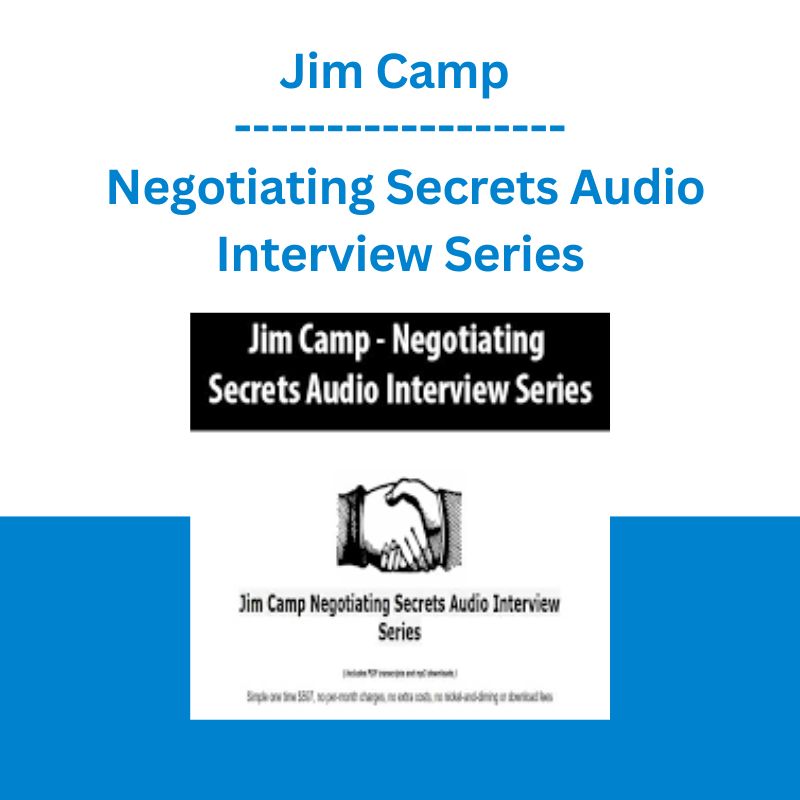








 Don Steele - Body Language Secrets A Guide During Courtship & Dating
Don Steele - Body Language Secrets A Guide During Courtship & Dating 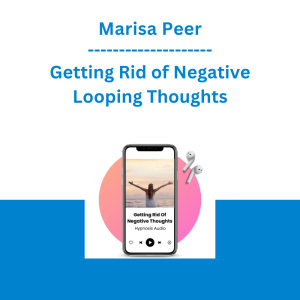 Marisa Peer - Ultimate Confidence Bundle
Marisa Peer - Ultimate Confidence Bundle 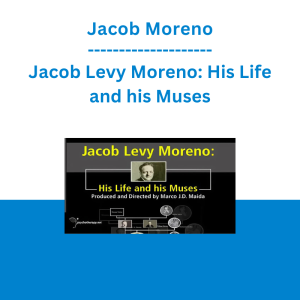 Jacob Moreno - Jacob Levy Moreno: His Life and his Muses
Jacob Moreno - Jacob Levy Moreno: His Life and his Muses  The Work From Anywhere Accelerator - Christian Martin
The Work From Anywhere Accelerator - Christian Martin  Jean LaMantia - Oncology Care and Rehab: What Nutrition Can Offer
Jean LaMantia - Oncology Care and Rehab: What Nutrition Can Offer  Racing Workshop - Complete Online Package
Racing Workshop - Complete Online Package 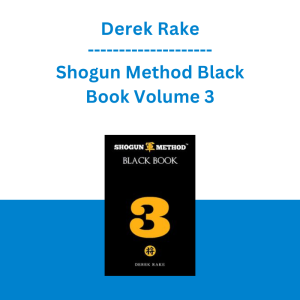 Derek Rake - Shogun Method Black Book Volume 3
Derek Rake - Shogun Method Black Book Volume 3 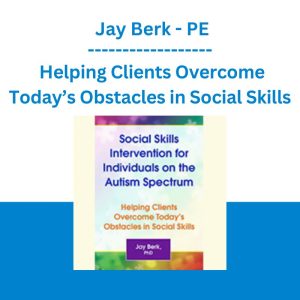 Social Skills Intervention for Individuals on the Autism Spectrum: Helping Clients Overcome Today’s Obstacles in Social Skills - Jay Berk - PE
Social Skills Intervention for Individuals on the Autism Spectrum: Helping Clients Overcome Today’s Obstacles in Social Skills - Jay Berk - PE  Greg Loehr - Advanced Option Trading With Broken Wing Butterflies
Greg Loehr - Advanced Option Trading With Broken Wing Butterflies  Crucial Competence: Building Emotional and Social Leadership
Crucial Competence: Building Emotional and Social Leadership  The Daily Traders – Exclusive Trading Mentorship Group
The Daily Traders – Exclusive Trading Mentorship Group  Dave Landry - Stock Selection Course
Dave Landry - Stock Selection Course  What She Wants (Be A Better Man Book 3) - Aubrey Allan
What She Wants (Be A Better Man Book 3) - Aubrey Allan  Debora Chasse - 3-Day: Comprehensive Training in Women's Health: Today's Best Practices for Improving Recovery and Outcomes - PESI
Debora Chasse - 3-Day: Comprehensive Training in Women's Health: Today's Best Practices for Improving Recovery and Outcomes - PESI  Megan Yelaney - Unique Content Camp
Megan Yelaney - Unique Content Camp  Joseph Wolpe - EP90 Clinical Presentation 17 - Analysis of a Social Neurosis: Treatment Possibilities
Joseph Wolpe - EP90 Clinical Presentation 17 - Analysis of a Social Neurosis: Treatment Possibilities 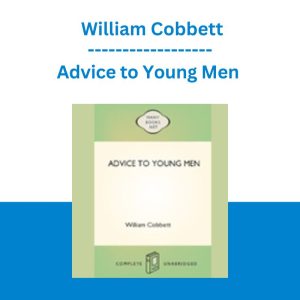 Advice to Young Men - William Cobbett
Advice to Young Men - William Cobbett  Jean-Pierre Isbouts - Searching for the Historical Jesus
Jean-Pierre Isbouts - Searching for the Historical Jesus  Jared Platt - From Capture Through Edit Using Lightroom
Jared Platt - From Capture Through Edit Using Lightroom  Jared Platt - Efficient Lighting & Post-Production
Jared Platt - Efficient Lighting & Post-Production